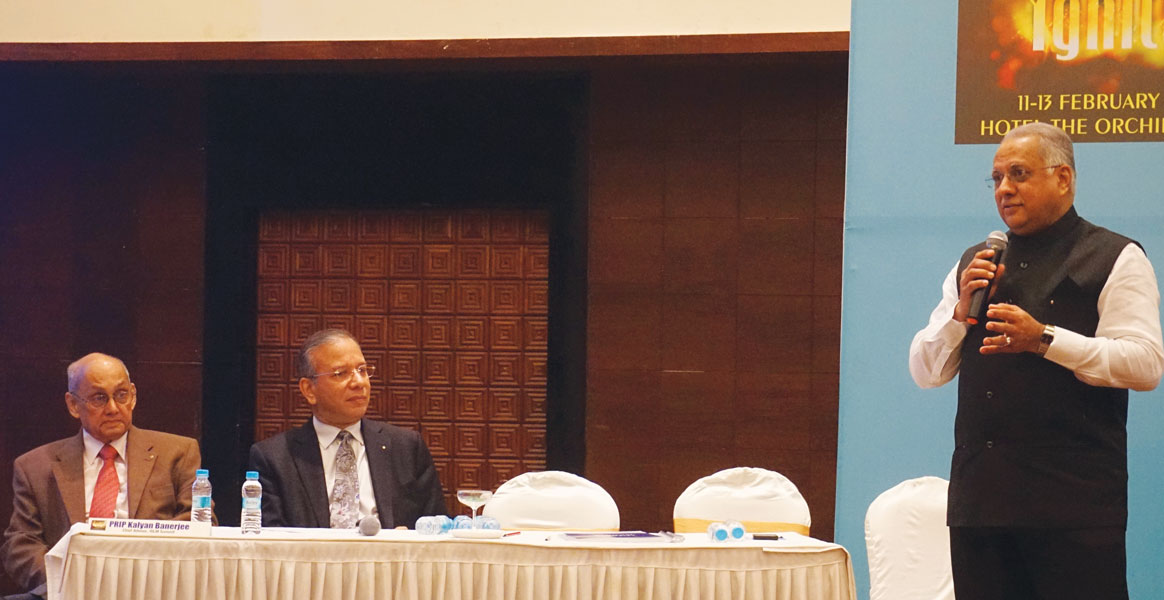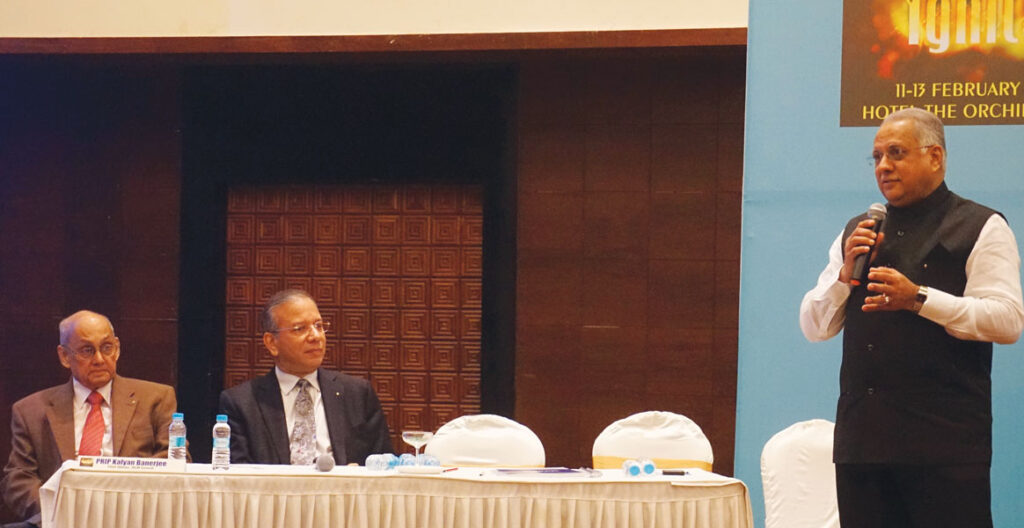
In Chennai recently we signed the Swachh Bharat declaration with (Union Minister) Venkaiah Naidu, who tweeted about it. While the party was on, somebody tapped me on the shoulder and said the PM’s office wants to talk to you … pleasantly surprised I took the call. They said you have uploaded only the third page. Where are the other pages; we want to read those. And after reading all of it, Modi tweeted: ‘Welcome this gesture by Rotarian community. Such efforts add a lot to Swachh Bharat initiative. My best wishes. #MyCleanIndia’ ”

Rotary had committed to building in one year 10,000 toilet blocks — each containing two separate toilets for male and female students, plus urinals for boys. And each block normally costs around Rs 1 lakh or more, depending on the construction. (Later, the number doubled to 20,000 toilet blocks to be built in two years!)
If you implement WinS properly, more doctors will come in as RI Directors as children’s health will improve, so there won’t be much of their practice left!
Looking towards the RILM Chair Shekhar Mehta, and RI Director P T Prabhakar, who were present in the room, Desai said, “As I talk PTP is watching very closely, because he has signed the Chennai declaration … and if we don’t deliver, do you know what will happen? PTP, Manoj and Shekhar will be in Tihar jail chakki peesing and peesing (referring to the famous scene filmed on Dharmendra in the Bollywood blockbuster Sholay.) It’s a pledge and promise we have made, and we have to fulfil it.”
Thus, in his trademark manner of sprinkling his presentations with spicy and humorous quotes, Desai got the assembled DGs, PDGs, DGEs and other Rotarians to raise the bar in pledging the number of toilet blocks they’d build in their region. This was at the ‘Ignite’ orientation session that preceded the three-day grand South Asia Literacy Summit.

Tied up and integrated in Swachh Bharat, he reminded them, were Swachh Vidyalayas, of which the most crucial element is WinS (Wash in Schools), an initiative Rotary had undertaken under the chairmanship of TRF Trustee Sushil Gupta. In this, Rotary is working very closely with the Government of India to ensure our schools have clean toilets, water and washing facilities and the children are adequately trained and sensitised to wash their hands with soap and water after defaecation and before their meals. The three essential features of WinS are Water, Sanitation and Hygiene.
Pride, commitment to schools
In our country, said Desai, everything was in place, beginning with the Constitution, Article 21(a) of which guaranteed as a fundamental right free and compulsory education to all children in the 6–14 age group. And we had schemes such as Sarva Siksha Abhyan, in plenty “but still things are not happening. Why? Because partnerships are needed, and that’s where our value comes in. I don’t have to tell you about the benefits of WinS; it is about pride and commitment to our schools … our society.”
In an Agra school when we put up separate toilet for girls, there were only 5 girls, now there are 150.
The idea was to catch them young to inculcate hygienic behaviour; “if the next generation starts doing all these, their health will improve and diseases reduce. And of course, you will have more doctors coming as RI Directors because there won’t be much of their practice left! That will be the impact of Swachh Bharat.”
But, on a serious note, he added, WinS was not only a huge investment in health and the well being of our future generations, but would also promote gender equity. Separate toilets for girls would ensure privacy and dignity to girls, specially the adolescent ones during their menstrual cycle. There was enough evidence to show that attendance and retention of female students improved once clean and separate toilets with water were provided for girls. “Sharat (Chandra, DGE D 3110) took me to inaugurate a toilet block in Agra. At that time there were only five girls there, now there are 150.
Such is the impact of toilets for girls. And these also result in increased retention of female teachers,” Desai added.
With two drops of the polio vaccine we did mass immunity. Here we are talking about mass hygiene.
Better attendance leads to better performance of students. “With two drops of the polio vaccine we did mass immunity. Here we are talking about mass hygiene.”
Rotary magic
Desai said according to one estimate over 1.01 lakh toilets for girls and over 1.52 lakh toilets for boys were missing in our schools. The real figure might be more, but whatever it was, Rotary will be building a chunk of the missing toilets. “No wonder Venkaiah Naidu and Smriti Irani appreciate Rotary,” Desai said, amidst thunderous applause.
But, he cautioned them, this was only a promise they had made; they were yet to deliver.
He then took commitments from participants from various Districts and clubs on how many toilets blocks they would deliver, and urged them to go the extra mile to create Happy Schools as well. (Details of coordinators, Zonal chiefs and National Executive members of WinS in the graphic). This would mean, apart from clean toilets and washing facilities, boundary walls, desks, playgrounds, etc.
The model of a pre-fabricated toilet would be displayed to them at the summit venue in Pune. Normally each block costs Rs 1 lakh, but thanks to the volume they were delivering, the cost had been bargained down to Rs 60,000, and it includes a water tank too! Also, the pre-fabricated blocks could be put together in just four hours. “The good news is that you do not have to raise this money; the GoI – PSUs — will give it to us.
Maintenance crucial
But the Rotary expertise and commitment would really need to kick in after the toilet blocks were built, when operational maintenance would become crucial.
Good washing spaces in schools were critical too; according to Government data based on a survey in 352 schools, “49 per cent schools do not have any designated washing space. What it really means is that they don’t even have a simple wash basin. And 49 per cent have only water; and only 32 per cent have soap and detergent, so kafi dhanda karne ka baki hei. (A lot of work needs to be done). And that includes maintenance.”
He said that Vinay (Kulkarni, PDG) had roped in an agency to train 500 women to clean and maintain the toilets in Pune and that model would have to be replicated across India.
Desai added that the preferred ratio and prescribed norms were one toilet plus three urinals for 40 students but “we have decided on two toilets plus other facilities. For girls in the puberty age group there are no instructions. But obviously they require soap for menstrual hygiene, and we will do it for them.”
Happy meeting place
While Mehta’s group was working on total literacy and under Sushil Gupta’s leadership, WinS would go ahead full blast, “where do the two meet? In schools. If you do only WinS, it doesn’t become a Happy School. But if you do a Happy School, WinS is automatically taken care of.”
Desai expressed the confidence that the existing DGs, DGEs and PDGs, with help of their clubs, would implement this project in a befitting manner.
Urging the Rotary leaders present in the room to go beyond just building toilet blocks and also provide water tanks, water filters, sufficient hand washing facilities, and taps with a supply of soap, Desai wrapped up his speech with a wry: “There is no money, so don’t expect any travel or hotel expenses. But it is a job we have to do, so let’s do it.”
Rotary ho ke aata hu
The incoming Rotary International Director Manoj Desai, known for his interesting presentations/lectures, didn’t let down the Rotarians gathered in Pune to learn more about the Rotary WinS project. Underlining the importance of branding, Desai said that he was recently in Nasik “where we are building 213 toilets … boys and girls were standing and chatting and suddenly a boy said: ‘Rotary ho ke aata hu!”
Similarly in Jamnagar in Gujarat, Rotary had given 1,500 water filters in schools, where some of the children even brought empty bottles to take home clean drinking water. “There they say: Rotary pee ke aata hu!”
___________________
Click below for
List of WinS Coordinators
___________________






